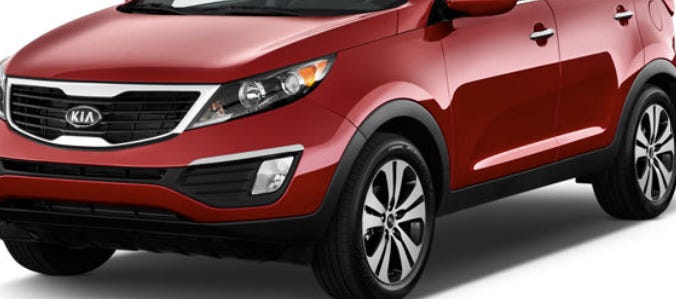Power issues put the Critical Reader behind for a few days. We are working to get back on track to cover important topics.
Chicago Mayor Sues Kia and Hyundai Over Car Thefts
A couple of months ago, the Critical Reader reported that Cleveland was suing the manufacturers of Kia and Hyundai for failing to install anti-theft technology in certain models, claiming that has led to a dramatic increase in car thefts. Now Chicago is going the same route, filing a lawsuit against Kia Corporation, Kia America, Hyundai Motor Company and Hyundai Motor America. Chicago is asking for fines and other penalties to be assessed against the companies for not having vehicle immobilizers in 2011 and 2022 models in the United States.
Car thefts in general have increased in Chicago this year, and it is estimated that about half of those thefts are Kia and Hyundai models.
“The impact of car theft on Chicago residents can be deeply destabilizing, particularly for low- to middle-income workers who have fewer options for getting to work and taking care of their families,” Chicago Mayor Brandon Johnson said. “The failure of Kia and Hyundai to install basic anti-theft prevention technology in these models is sheer negligence, and as a result, a citywide and nationwide crime spree around automobile theft has been unfolding right before our eyes.”
In Cleveland, Kia and Hyundai thefts continue to be a problem, and in at least one case have proven deadly. In early August, a stolen Kia crashed into another car in the city’s Old Brooklyn neighborhood, killing a 21-year-old woman. Police later announced that a 16-year-old boy had been arrested in connection with the incident and charged with murder and aggravated vehicular homicide.
Canada Considering Age-Old Methods to Stop Wildfires
Nothing is new about fire-prevention zones, which are sections of fire-prone forests that are cleared to reduce the risk of spreading fires; however, some parts of Canada are discovering a new-found appreciation for them. In British Columbia, a fire-prevention zone recently spared a city from mass devastation.
Creating an area that is resistant to fire involves thinning forests in the spring, before the dry season begins. It also includes controlled burning: setting deliberate small fires in forests to clear debris that can encourage the rapid spread of fires.
This type of fire mitigation has been used by Native Americans for hundreds of years and with great success, but it has encountered challenges by some government entities in Canada and the United States.
In Canada, “use of prescribed fire has decreased over the 25 years in British Columbia due to increased regulation (including problems with agency approval processes and timelines), smoke concerns, fear of escapes, and a lack of qualified and experienced practitioners. There is no prescribed fire certification framework in Canada: The Canadian Interagency Forest Fire Centre does not have any prescribed-fire related certification, so people lean on U.S.-based certifications that do not apply. The only prescribed fire planning course is offered by Parks Canada and Alberta, but limits enrollment numbers.”
The United States has its own set of rules that makes fire mitigation difficult. In Colorado “only a small fraction of what needs to be burned ends up being burned. In 2020, firefighters proposed burning 312,943 piles of branches and logs throughout the state but were able to do only about 18% of that work, records show. Of 88 burns proposed to consume vegetation across a large number of acres — in a forest or grassy area — only 55% were completed that year.”
Many of Canada’s indigenous people believe that their traditional methods of fire mitigation are vital in preventing out-of-control forest fires like the ones that have burned in Canada this year. Dane de Souza, a citizen of Metis Nation and a specialist in Indigenous fire management, said in an interview, “Indigenous people have been managing fires for thousands of years. Putting fire on the land is a very human thing to do. But we’ve replaced fires of choice with fires of chance. When we talk about climate resilience and sustainability, that’s Indigenous knowledge. What is being Indigenous? It’s a connection to the land.”
* BONUS (just because it’s so terrifying)
Giant Alligator Caught in Mississippi
We’ll just leave this here and say, “yikes.”






Well, that's a pretty big 'gator those boys caught in Mississippi. But that's gator country anyway. On the other hand, there's still a 4-foot gator prowling around Ambrose Brook in Middlesex, NJ. As of last night, it's still eluding police and animal control officers, and has been for a number of days. Hopefully they'll find it before it's as big as the one in MS.
On the Hyundai and Kia issue, both automakers have finally responded (after several years of inaction) and developed a software fix that will correct the problem in the older models that did not have theft deterence (I understand more recent models have it). However, they are not doing a recall and it's being released in a "phased approach" to probably keep dealers from being overwhelmed. I suspect one of the things the cities would like to do is force both companies to have recalls which are more aggressive in getting the repairs made. NHSTA for some reason doesn't seem to be pushing them either. Until your car gets the fix, go out and buy a Club and use it. I would suspect that if auto insurers would start backing off on paying claims that might be another way to get the ball rolling. For now I would NOT buy an older models (2011-2022) of either car.